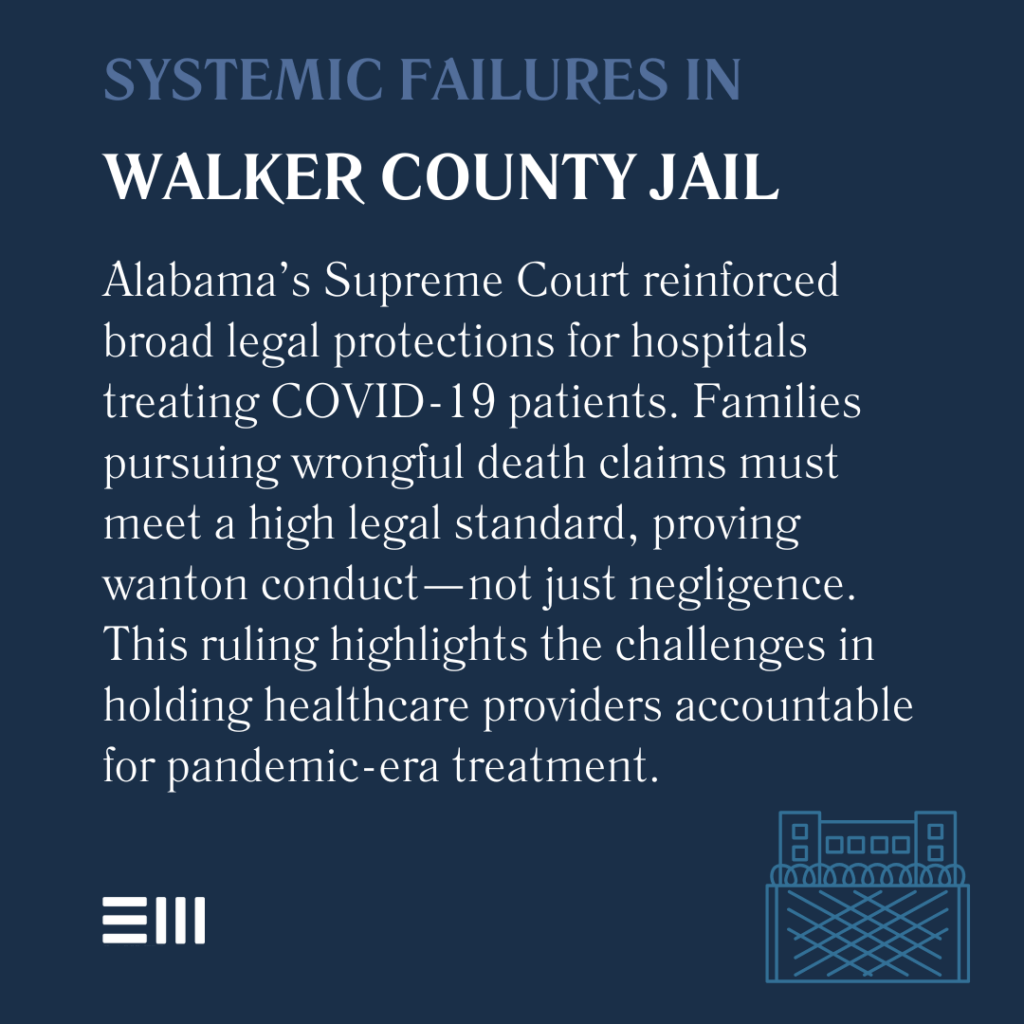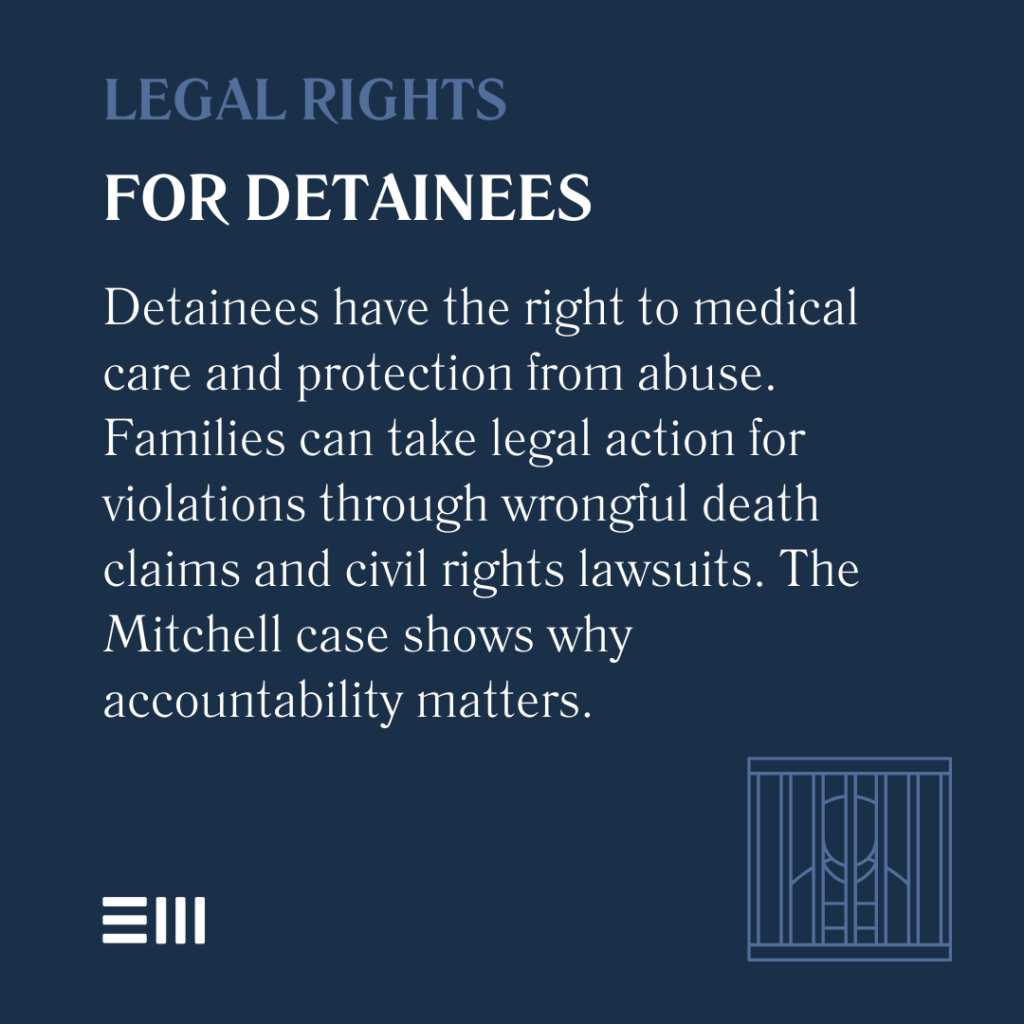
An Alabama sheriff’s deputy’s guilty plea reveals disturbing details about institutional abuse in Walker County and highlights critical legal considerations for victims of law enforcement misconduct.
Case Development
Court documents revealed that Walker County Sheriff’s Deputy Carl Lofton Carpenter, 55, has agreed to plead guilty to two counts of deprivation of rights in connection with the 2023 death of Tony Mitchell. The case has sent shockwaves through Alabama’s legal community and raised serious questions about accountability in law enforcement.
According to the plea agreement made public on March 26, Carpenter admitted to assaulting Mitchell, who was suffering from a mental health crisis, during an arrest in 2023. Mitchell later died of sepsis and hypothermia while detained in the Walker County Jail, just two weeks after his initial arrest.
Disturbing Details Emerge
The plea document contains troubling details about the treatment Mitchell received. Court records state that Carpenter stepped on Mitchell’s genitals while he was handcuffed, saying, “This is how we treat seizures in Walker County.” The deputy then dragged Mitchell on the ground, kicked him, and threw him roughly into the police car.
Perhaps most alarming is that, according to the plea document, Mitchell was “compliant, obeyed commands, and posed no threat of harm to the officers” during this assault.
The case began when deputies, including Carpenter and fellow Deputy James Handley, responded to a welfare check requested by one of Mitchell’s relatives. At the time, the sheriff’s office claimed Mitchell had been talking about “portals to hell” and had allegedly fired a weapon at officers.
The plea agreement contains a particularly disturbing admission, stating that Carpenter “had become accustomed to harming arrestees unnecessarily consistent with the culture of the Walker County Sheriff’s Office.”
Systemic Issues Revealed
This case has exposed what appears to be widespread misconduct within the Walker County Sheriff’s Office. The plea document directly implicates Walker County Sheriff Nick Smith, stating he was “directly responsible” for sending Mitchell to the local jail despite Mitchell “demonstrating symptoms of severe mental illness.”
Court records also reveal that at least 10 other jail employees have already pleaded guilty to charges related to Mitchell’s death. A previous plea deal made public in January 2024 disclosed that officers intentionally kept conditions in the Walker County Jail “as filthy as possible” to convince county commissioners to increase salaries and the jail budget.
Mitchell was reportedly detained in a concrete cell covered in feces with no toilet or access to medical attention during his confinement. County records confirm that a commissioner visited the jail just two weeks after Mitchell’s death.

Legal Consequences
Carpenter now faces a maximum of 10 years in prison and a potential fine of up to $250,000 for his role in Mitchell’s mistreatment.
Meanwhile, Deputy Handley was indicted in March 2024 on charges of assaulting Mitchell and witness tampering for allegedly lying to a separate grand jury about the incident in August 2023.
Legal Implications for Alabama Residents
This case highlights several critical legal considerations for Alabama residents:
- Civil Rights Violations: Federal law provides remedies for individuals whose constitutional rights are violated by those acting under color of law, such as police officers or corrections officials.
- Wrongful Death Claims: In Alabama, when negligence or misconduct leads to a death, the personal representative of the deceased’s estate can pursue a wrongful death action.
- Municipal Liability: When misconduct is found to be part of a pattern or practice within a government agency, the agency itself may bear liability for failing to properly train, supervise, or discipline employees.
- Mental Health Crisis Response: The case underscores the tragic consequences that can result when law enforcement lacks proper training for responding to mental health emergencies.
This deeply troubling incident illustrates how institutional failures can lead to devastating consequences for vulnerable individuals like Mitchell, who was clearly in need of mental health intervention rather than punitive confinement.
Rights of Detainees and Their Families
For Alabama families who have loved ones in detention, this case serves as a sobering reminder of several important legal principles:
- Detainees have a constitutional right to adequate medical care while in custody;
- Excessive force against compliant individuals violates clearly established constitutional protections;
- Deliberate indifference to serious medical needs can form the basis for legal action; and
- Family members may have legal recourse if a loved one suffers mistreatment in custody.
These rights exist regardless of the circumstances that led to an individual’s detention, and they apply even to those who have not been convicted of any crime.
Understanding these legal protections is essential for families navigating the complex intersection of law enforcement, detention, and mental health care in Alabama. When these systems fail, the consequences can be devastating, as the Mitchell case tragically demonstrates.

Accountability and Prevention
While criminal prosecutions like those against Carpenter and other Walker County employees represent one avenue for accountability, civil remedies also play a crucial role in addressing wrongdoing and preventing future tragedies.
These can include:
- Section 1983 civil rights claims for constitutional violations;
- Alabama wrongful death actions;
- Claims for negligent training and supervision; and
- Demands for policy changes and reforms.
Effective accountability requires not only individual consequences but also systemic changes to prevent similar incidents from occurring in the future. This may include improved mental health response training, better jail oversight, and stronger protections for vulnerable detainees.
The plea agreement’s frank acknowledgment of a “culture” of abuse within the Walker County Sheriff’s Office suggests that this case represents not just individual misconduct but a broader institutional failure that must be addressed comprehensively.
Protecting Your Rights
For Alabama residents concerned about the treatment of detained loved ones, especially those with mental health conditions, several preventive steps are worth considering:
- Maintain regular contact with detained family members when possible;
- Document any complaints or concerns about treatment;
- Request mental health evaluations when appropriate; and
- Consider consulting with an attorney experienced in civil rights and wrongful death matters if you suspect mistreatment.
Proper legal guidance can be essential in navigating the complex legal landscape surrounding detention, mental health, and law enforcement accountability in Alabama.
Looking Forward
As this case continues to unfold, it serves as a powerful reminder of the critical importance of oversight, accountability, and proper training in law enforcement agencies across Alabama. The tragic death of Tony Mitchell illustrates what can happen when these systems fail.
For families of victims, the legal process can provide not only a measure of justice but also a platform for advocating for essential reforms that might prevent similar tragedies in the future. While no legal remedy can fully address the loss of a loved one under such circumstances, holding responsible parties accountable remains a vital step toward both justice and prevention.
Fight Harder, Fight Smarter
If you or a loved one has experienced mistreatment by law enforcement or while in custody, the experienced attorneys at Baxley Maniscalco are here to help.
Our team has extensive experience representing clients in complex personal injury matters throughout Alabama, including cases involving civil rights violations and wrongful death.
We understand the devastating impact these situations can have on families, and we’re committed to providing aggressive representation to hold responsible parties accountable. Our attorneys work tirelessly to ensure justice for victims of misconduct and to secure the compensation they deserve.
If you’re concerned about the treatment of a loved one in custody or need guidance regarding a potential wrongful death or civil rights claim, schedule a consultation with our team to discuss your legal options.
Can't find what you're looking for? Search our site below.










